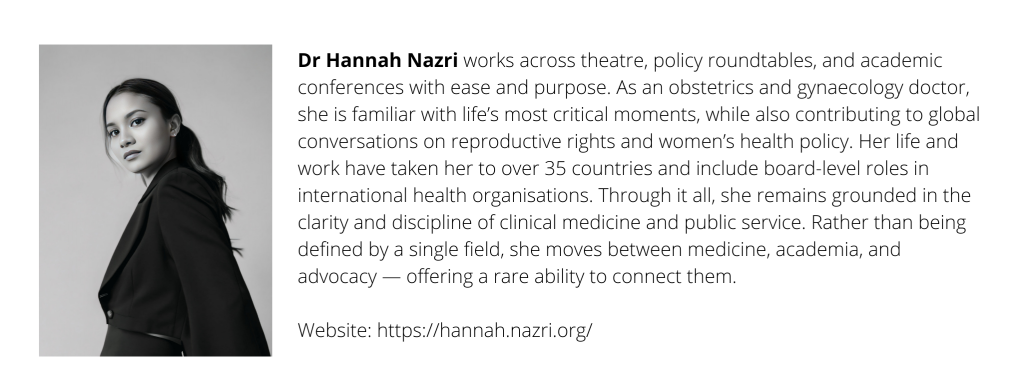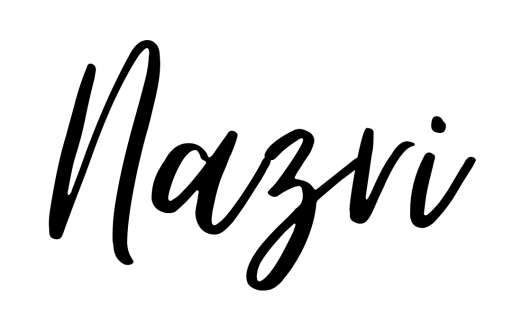First published on the Royal Commonwealth Society (RCS) website. For the full blog post with my other three amazing colleagues in 2019. Here I detail my journey in medicine, my research interests, the challenges I face, and my passion for women’s rights advocacy.
The RCS asked four female Associate Fellows working in the field of science to answer some questions about their experiences. There is still a great deal of gender bias in the world of science, so we wanted to share the stories of these incredible women to inspire others looking to create better gender balance in the world.
Hannah Nazri
What do you do? I am a DPhil candidate in Obstetrics & Gynaecology (ObGyn) at the University of Oxford. I am also a medical doctor, having graduated from the University of Bristol in 2013. During my medical degree, I was also offered the opportunity to pursue a one-year BSc in Medical Sciences with Medical Physics and Bioengineering from University College London, for which I successfully obtained a Second Class Honours (Upper Division) in 2010. I became interested in endometriosis research during my MSc in Clinical Embryology, which I had pursued after my foundation training. I decided to pursue the MSc and not go straight into a specialty training programme, so I could explore my interests in reproductive sciences and research with a view to pursuing a clinical academic career in either ObGyn, or Reproductive Endocrinology (an Internal Medicine specialty). After graduating from my MSc in 2016, I went back to work in the clinical environment for one year as an Internal Medicine trainee before deciding that I preferred to do endometriosis research: so here I am in Oxford as a second-year DPhil student at the Nuffield Department of Women’s & Reproductive Health at John Radcliffe Hospital.
Why did you become interested in science? I can think of many moments in life that made me become interested in science. My mother, for one, is a Biochemistry & Pharmacology graduate from Monash University, and since I was young, she made a point to explain to me the science behind everything. For instance, if she was cooking eggs, she would turn it into an interactive science learning experience by explaining to me that the clear viscous egg white turns white and solidifies due to protein denaturation during which the egg protein loses its quaternary structure. I was also a very curious child and according to my parents, I could not stop yapping away about the things I have read and would ask them more and more questions! So, I became interested in science because my curiosity was encouraged by my parents who supplemented my interest with visits to science museums, buying books, helping me with school projects, and, of course, patiently explaining to me how things around me worked. I remember when I was about 3 years old, I was at the doctor’s office about to receive my measles and rubella vaccination and I wanted to run off. Unfortunately, my tiny legs did not take me very far. But what convinced me to have the vaccination was what my father explained to me, “This is so that your body can build an army of antibodies to fight infection.” Yay for antibody-soldiers!
From then on, I started toying with the idea of becoming a doctor (plus a bunch of other things, actually). But the most pivotal moment was when I almost died from the Rocky Mountain Spotted Fever when I was 14. I had spent a week in hospital and luckily this was quickly diagnosed, and I survived to tell the tale.
Please share your greatest achievement to date. This is a difficult one. Last year was a very challenging year for me, in terms of my personal life where I suffered two family deaths and a relationship breakdown. Professionally, it was a great year as I managed to present my work at the largest conference of its kind for my specialty, the European Society of Human Reproduction & Embryology Annual Meeting with a travelling scholarship from my department. I was also enthralled to have a personal meeting with the first female Deputy Prime Minister of Malaysia and medical doctor, Dato’ Seri Dr Wan Azizah, during the 12th Asia-Europe Meeting in Brussels.
What are your career goals and aspirations? Post-DPhil, I am hoping to pursue a career as a clinical academic in ObGyn. Ideally, I would like to combine my academic medical career with consultancy, non-profit work and a business of my own with a lot of travelling. At present, I am also the Chair of the Board of Trustees of The Kalsom Movement, a student-led education charity based in Malaysia.
What is the biggest challenge you have faced being a woman in science? Thinking about the experiences I have had, made me realise that not many are lucky enough to have parents like mine. Not surprisingly, parental influence has a huge impact on their children’s career choices. My parents have never forced their ideas onto their children, but they have made a huge effort to encourage our interests. For instance, when I wanted to pursue my DPhil and leave my clinical job, I was faced with a lot of tension and stress from many people because it also meant that I was leaving my source of income (and potentially becoming a burden to my ageing parents). To date, I still experience a lot of guilt and discomfort from this backlash, but my parents convinced me that I could do anything I want, even at this age. Why? At my age, society still expects me to settle down with a man and bear his children.
It is sad to think that I am a “trailblazer” for not going through the prescribed pathway of school, work, marriage then children. It still pains me that I disappointed my paternal grandmother in this way. It pains me when I go on to the Malaysian social media scene to read comments like, “There is no point studying so hard up to PhD level and demand a huge dowry when you cannot even cook or take care of your husband.” It is sad that degrees and qualifications are just for the husband-to-be to brag to others about having a doctor-wife, then make her quit her job or overwork her with housework – on top of clinical commitments. But a word of caution: while it is easy to generalise the Malaysian population, remember that 46% of the Princeton Class of 2006 expected their wives to quit/suspend their careers for the family in favour of their husbands’ career development.
It is true I have not truly suffered and could turn a blind eye to all of these. I am lucky that my biggest challenge at present is just to finish up my DPhil. I am lucky there is provision for less-than-full-time training and good maternity leave packages in the UK. But for those women who, for whatever reason, cannot speak for themselves, I am speaking for them.
Do you have any advice for women and girls wanting to become involved in science? My advice would be to stay curious and seek out relevant experiences. Stay strong amid societal backlash. Find your tribe. Some people will always want to discourage you, so don’t listen to them. In fact, I was once told that I couldn’t do medicine. Prove them wrong!
Who is a woman in science that you admire and why? Elizabeth Garrett Anderson, the first woman to qualify in Britain as physician and surgeon. She was also a suffragette, who wrote to her bosses asking to allow her to take part in the movement, and she also made sure she had cover for her shifts in case she got imprisoned. There, I have given you two reasons why you should admire this woman, do look her up! I truly believe that female doctors or scientists can be real agents of change. We are role models to younger girls who are thinking about becoming involved in science.
Can you share an interesting fact from your field of expertise? Do you know that the word “uterus” means hysteria in Greek? So, women, by default, according to men, are crazy.
Why do you think it’s important for women and girls to pursue a career in the sciences? Women and medicine have long been forgotten in scientific research. To date, most of research funding goes to more popular diseases and a smaller portion towards ObGyn research. Sampson’s theory of retrograde menstruation in 1932 remains to be one of the most important theories for explaining endometriosis, and while this partially explains endometriosis, we still do not understand the condition that plagues 10% of the female population with a societal cost of €9.9 billion to the UK. Women are more likely to have their symptoms dismissed by doctors as compared to men. They are more likely to be told by their doctors that their symptoms are just “all in their heads”. According to a 2014 study by the Brigham and Women’s Hospital in Boston, the science that informs medicine fails to consider the crucial impact of sex and gender. Yet women’s overall lifetime risk of Alzheimer’s disease is two-fold compared to men due to the impact of hormonal changes at menopause. Women also have higher rates of adverse drug reactions as compared to men. All of these should give enough reasons why girls should be encouraged to pursue medicine and the sciences.
Related posts:
- Bernama TV ‘Tea With Tehmina’ Episode 2: The Kalsom Movement
- Countering Everyday Extremism Against Women: The Other Pandemic
- Maintaining Boundaries As Women In Leadership: Oh It Is So Difficult To Be A Career Woman!
- Medicine In The Age Of Disinformation | Asia Europe Foundation Education
- In The Pursuit Of A Great Education And Career | Phenotype, Issue 32 Hilary Term 2019
Like what you read? Subscribe to my blog.
About the Author: Hannah Nazri


Keep flying high, Dr!